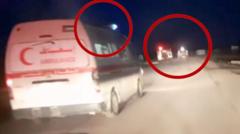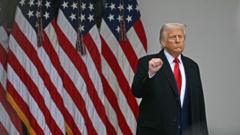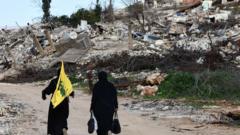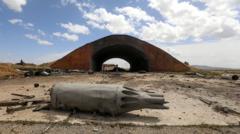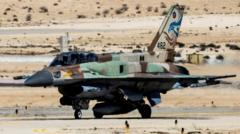The U.S. deputy Middle East envoy's discussions highlight ongoing instability in the region following a recent cease-fire.
U.S. Envoy Visits Lebanon Amid Growing Tensions Over Cease-Fire

U.S. Envoy Visits Lebanon Amid Growing Tensions Over Cease-Fire
Morgan Ortagus meets Lebanese officials as Israel-Hezbollah tensions escalate.
On Saturday, Morgan Ortagus, the U.S. deputy envoy for the Middle East, arrived in Lebanon for talks with senior officials, amidst rising tensions between Israel and Hezbollah that threaten a fragile truce established in November. Strikes in the region over the past two weeks have intensified concerns around the cease-fire's viability, compelling the U.S. to exert pressure on the Lebanese government to confront Hezbollah.
Ortagus met with President Joseph Aoun to address multiple pressing issues affecting southern Lebanon. The cease-fire granted the Lebanese military responsibility over this region, traditionally a Hezbollah stronghold. The situation has grown more precarious following recent rocket fire from militants towards Israel, leading Israel to retaliate with strikes on southern Lebanon and the outskirts of Beirut, targeting what it claims to be Hezbollah assets. Despite these escalations, neither Israel nor Hezbollah appear eager to reignite a full-scale conflict.
In the wake of the war that resulted in approximately 4,000 casualties and left close to a million individuals displaced, Lebanon is striving to rebuild its infrastructure. Ortagus and Aoun also discussed critical financial reforms being implemented by the new Lebanese government, aiming to attract foreign investment and assistance. The total economic toll from the conflict stands at an estimated $14 billion, with the World Bank asserting that Lebanon requires $11 billion to restore stability. The readiness of international supporters to aid Lebanon may hinge on the government's ability to exert control, including disarming Hezbollah, which has long been considered a rival power within the country.
Ortagus met with President Joseph Aoun to address multiple pressing issues affecting southern Lebanon. The cease-fire granted the Lebanese military responsibility over this region, traditionally a Hezbollah stronghold. The situation has grown more precarious following recent rocket fire from militants towards Israel, leading Israel to retaliate with strikes on southern Lebanon and the outskirts of Beirut, targeting what it claims to be Hezbollah assets. Despite these escalations, neither Israel nor Hezbollah appear eager to reignite a full-scale conflict.
In the wake of the war that resulted in approximately 4,000 casualties and left close to a million individuals displaced, Lebanon is striving to rebuild its infrastructure. Ortagus and Aoun also discussed critical financial reforms being implemented by the new Lebanese government, aiming to attract foreign investment and assistance. The total economic toll from the conflict stands at an estimated $14 billion, with the World Bank asserting that Lebanon requires $11 billion to restore stability. The readiness of international supporters to aid Lebanon may hinge on the government's ability to exert control, including disarming Hezbollah, which has long been considered a rival power within the country.

